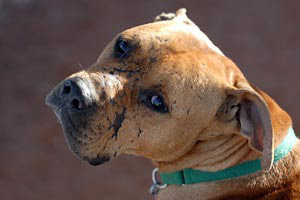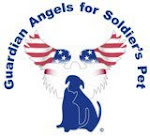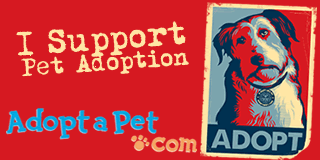There was a question about whether this was going to pass and for a bit late last night it didn't look good. But pass it did and the many puppies and their Mothers in puppy mills now are protected by law.
For some background go
here.
And please, do not buy dogs from pet stores. By and large, responsible breeders do not place their puppies in stores to be sold. Puppy mills exist for one reason; to breed in volume. One person makes money, yet thousands deal with the aftermath of overpopulation, abuse, strays, shelters needing reform, and this doesn't even begin to deal with the degradation of the breed that is taking place when all the breeder cares about is whether the dog looks like Paris Hilton's latest fetish. Instead, go to a shelter and rescue a dog. You won't believe it took you so long. If you must have a specific breed, try a rescue, try calling around to shelters, or look on Petfinder.com. Please make contacting a private breeder your last resort.
When you read the below proposal, consider how basic some of the listed items are, and then you may recognize how terrible life is for dogs in puppy mills.
2010 Initiative Petitions Approved for Circulation in Missouri
Statutory Amendment to Chapter 273, Relating to Dog Breeders
2010-085, Version 1
THE PROPOSED STATUTE
Be it enacted by the people of the State of Missouri:
Section A. One new section is enacted, to be known as section 273.345, to read as follows:
273.345. 1. This section shall be known and may be cited as the ”Puppy Mill Cruelty Prevention Act.”
2. The purpose of this Act is to prohibit the cruel and inhumane treatment of dogs in puppy mills by requiring large-scale dog breeding operations to provide each dog under their care with basic food and water, adequate shelter from the elements, necessary veterinary care, adequate space to turn around and stretch his or her limbs, and regular exercise.
3. Notwithstanding any other provision of law, any person having custody or ownership of more than ten female covered dogs for the purpose of breeding those animals and selling any offspring for use as a pet shall provide each covered dog:
(1) Sufficient food and clean water;
(2) Necessary veterinary care;
(3) Sufficient housing, including protection from the elements;
(4) Sufficient space to turn and stretch freely, lie down, and fully extend his or her limbs;
(5) Regular exercise; and
(6) Adequate rest between breeding cycles.
4. Notwithstanding any other provision of law, no person may have custody of more than fifty covered dogs for the purpose of breeding those animals and selling any offspring for use as a pet.
5. For purposes of this section, and notwithstanding the provisions of section 273.325, the following terms have the following meanings:
(1) ”Covered dog” means any individual of the species of the domestic dog, Canis lupus familiaris, or resultant hybrids, that is over the age of six months and has intact sexual organs.
(2) ”Sufficient food and clean water” means access to appropriate nutritious food at least once a day sufficient to maintain good health; and continuous access to potable water that is not frozen, and is free of debris, feces, algae, and other contaminants.
(3) ”Necessary veterinary care” means, at minimum, examination at least once yearly by a licensed veterinarian; prompt treatment of any illness or injury by a licensed veterinarian; and, where needed, humane euthanasia by a licensed veterinarian using lawful techniques deemed “Acceptable” by the American Veterinary Medical Association.
(4) ”Sufficient housing, including protection from the elements” means constant and unfettered access to an indoor enclosure that has a solid floor; is not stacked or otherwise placed on top of or below another animal’s enclosure; is cleaned of waste at least once a day while the dog is outside the enclosure; and does not fall below 45 degrees Fahrenheit, or rise above 85 degrees Fahrenheit.
(5) ”Sufficient space to turn and stretch freely, lie down, and fully extend his or her limbs” means having:
(1) sufficient indoor space for each dog to turn in a complete circle without any impediment (including a tether);
(2) enough indoor space for each dog to lie down and fully extend his or her limbs and stretch freely without touching the side of an enclosure or another dog;
(3) at least one foot of headroom above the head of the tallest dog in the enclosure; and
(4) at least 12 square feet of indoor floor space per each dog up to 25 inches long; at least 20 square feet of indoor floor space per each dog between 25 and 35 inches long; and at least 30 square feet of indoor floor space per each dog for dogs 35 inches and longer (with the length of the dog measured from the tip of the nose to the base of the tail).
(6) ”Regular exercise” means constant and unfettered access to an outdoor exercise area that is composed of a solid, ground level surface with adequate drainage; provides some protection against sun, wind, rain, and snow; and provides each dog at least twice the square footage of the indoor floor space provided to that dog.
(7) ”Adequate rest between breeding cycles” means, at minimum, ensuring that dogs are not bred to produce more than two litters in any 18 month period.
(8) ”Person” means any individual, firm, partnership, joint venture, association, limited liability company, corporation, estate, trust, receiver, or syndicate.
(9) ”Pet” means any domesticated animal normally maintained in or near the household of the owner thereof.
(10) ”Retail pet store” means a person or retail establishment open to the public where dogs are bought, sold, exchanged, or offered for retail sale directly to the public to be kept as pets, but that does not engage in any breeding of dogs for the purpose of selling any offspring for use as a pet.
6. A person is guilty of the crime of puppy mill cruelty when he or she knowingly violates any provision of this section. The crime of puppy mill cruelty is a class C misdemeanor, unless the defendant has previously pled guilty to or been found guilty of a violation of this section, in which case each such violation is a class A misdemeanor. Each violation of this section shall constitute a separate offense. If any violation of this section meets the definition of animal abuse in section 578.012, the defendant may be charged and penalized under that section instead.
7. The provisions of this section are in addition to, and not in lieu of, any other state and federal laws protecting animal welfare. This section shall not be construed to limit any state law or regulation protecting the welfare of animals, nor shall anything in this section prevent a local governing body from adopting and enforcing its own animal welfare laws and regulations in addition to this section. This section shall not be construed to place any numerical limits on the number of dogs a person may own or control when such dogs are not used for breeding those animals and selling any offspring for use as a pet. This section shall not apply to a dog during examination, testing, operation, recuperation, or other individual treatment for veterinary purposes; during lawful scientific research; during transportation; during cleaning of a dog’s enclosure; during supervised outdoor exercise; or during any emergency that places a dog’s life in imminent danger. This section shall not apply to any retail pet store; animal shelter as defined in section 273.325; hobby or show breeders who have custody of no more than ten female covered dogs for the purpose of breeding those dogs and selling any offspring for use as a pet; or dog trainer who does not breed and sell any dogs for use as a pet. Nothing in this section shall be construed to limit hunting or the ability to breed, raise, or sell hunting dogs.
8. If any provision of this section, or the application thereof to any person or circumstances, is held invalid or unconstitutional, that invalidity or unconstitutionality shall not affect other provisions or applications of this section that can be given effect without the invalid or unconstitutional provision or application, and to this end the provisions of this section are severable.
9. The provisions herewith shall become operative one year after passage of this Act.
Share







































